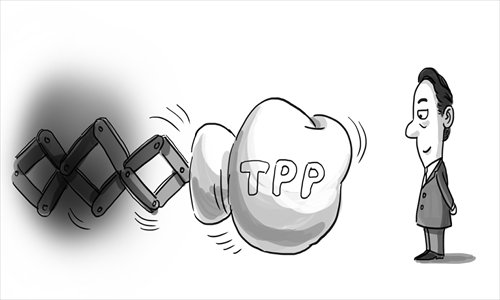TPP more about economy than anti-China regional alliances

Illustration: Liu Rui/GT
The US and 11 other Pacific Rim countries clinched the largest ever trade-liberalizing deal on Monday. The Trans-Pacific Partnership (TPP) agreement will create a free trade zone in the Asia-Pacific region, within which duties on various services and goods will be reduced or eliminated. The deal, which still requires ratification from lawmakers, is expected to affect 40 percent of the world economy.
Upon the announcement, the TPP, after years of negotiations, has aroused heated discussions in China. The TPP, initiated by the US, includes Australia, Brunei, Chile, Canada, Japan, Malaysia, Mexico, New Zealand, Peru, Singapore and Vietnam, but not China. Some argue that while these nations may hope to stay friendly with China, they will have to accept the economic claims by the US. And thus it is conjectured that the trade deal is aimed at Beijing, the key player in the Asia-Pacific region. Many analysts expect the TPP to balance Beijing's increasing clout and may even overwhelm China's economy.
Trade agreements have strategic significance and influence, but the TPP pact is fundamentally a trade agreement, rather than a strategic deal. It handles creating a free trade zone, establishing common rules and enhancing economic growth within the TPP members. Washington, by taking advantage of the lowered tariffs, is expecting to enlarge its exports to other nations. Although it may have some detrimental effects on China, it's an over-interpretation to say that the deal is aimed at containing China.
China is too large to be ring-fenced by a trade deal. Beijing is the largest trading partner for many neighboring nations, such as Singapore, Japan and Australia. These countries will, by no means, sever their economic and financial ties with China after joining the TPP. It is impossible to keep China away in the increasingly interdependent global economy.
Although Beijing may not meet the requirements to join the TPP at the current stage, its trading conditions are getting better. China has signed free trade agreements with South Korea and Australia. This has reflected China's efforts in upgrading its free trade zones with neighboring countries. It also foresees the nation's increasingly important role in the global trade in the near future.
Admittedly, Washington, in promoting the TPP, has some geopolitical considerations. US President Barack Obama said in a statement on Monday that "We can't let countries like China write the rules of the global economy. We should write those rules, opening new markets to American products while setting high standards for protecting workers and preserving our environment."
To write future trade rules is another reason for the US to initiate the TPP. The US hopes the TPP will be accepted as an international standard. After both the TPP and the Transatlantic Trade and Investment Partnership are finalized and scrutinized, Washington may require these rules to be written into the standards of the World Trade Organization. By then, China may have to abide by the rules written by the US. Despite the obstacles in fields including intellectual property, agriculture and medical patents, China should be aware of the possibility that the White House will get to write the new global trade rules.
To tackle the potential challenges posed by the TPP, the Chinese government should focus its attention on reform and opening up. At the same time, Beijing ought to facilitate the signing of a Bilateral Investment Trade with Washington. It would be wise for China to bring its advantages into full play when facing the US-initiated TPP.
The author is a research fellow at the Institute of American Studies of the Chinese Academy of Social Sciences. opinion@globaltimes.com.cn